Leadership Management in a Global Context: Reflection Assignment
VerifiedAdded on 2022/08/26
|9
|2131
|15
Homework Assignment
AI Summary
This assignment is a self-reflection exercise on leadership management, specifically analyzing the concepts of leadership versus likership within a global context. The student utilizes the Gibbs reflective cycle to examine personal experiences and observations, including an analysis of an article discussing the importance of likership. The assignment covers description, feelings, evaluation, analysis, conclusion, and an action plan, which includes suggestions for improvement in areas such as communication and the avoidance of bias and favoritism. The student explores various leadership theories, ethical considerations, and the impact of personal perceptions on leadership effectiveness. The reflection aims to identify strengths and weaknesses and suggest actionable steps for personal and professional development in the realm of leadership.
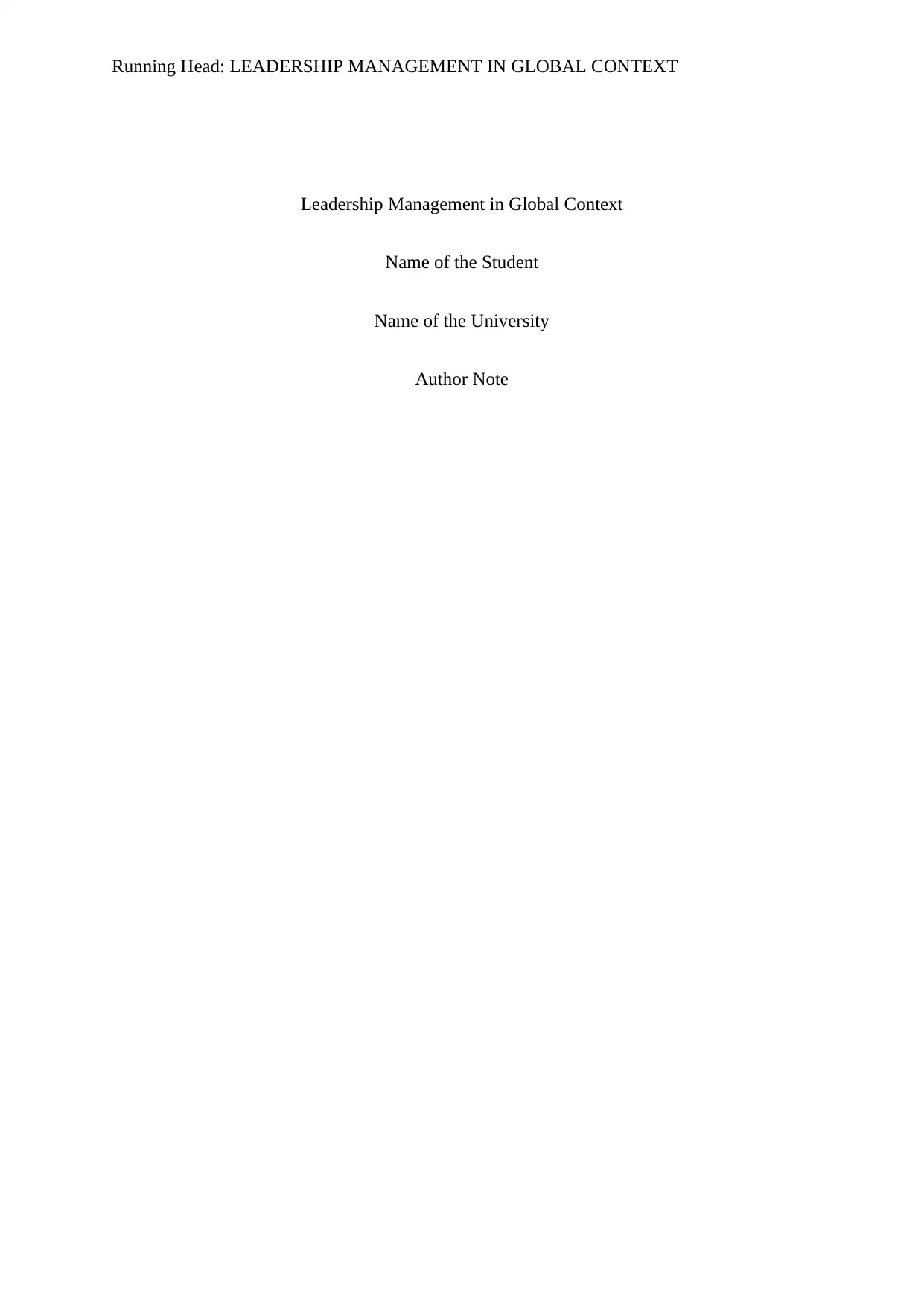
Running Head: LEADERSHIP MANAGEMENT IN GLOBAL CONTEXT
Leadership Management in Global Context
Name of the Student
Name of the University
Author Note
Leadership Management in Global Context
Name of the Student
Name of the University
Author Note
Paraphrase This Document
Need a fresh take? Get an instant paraphrase of this document with our AI Paraphraser
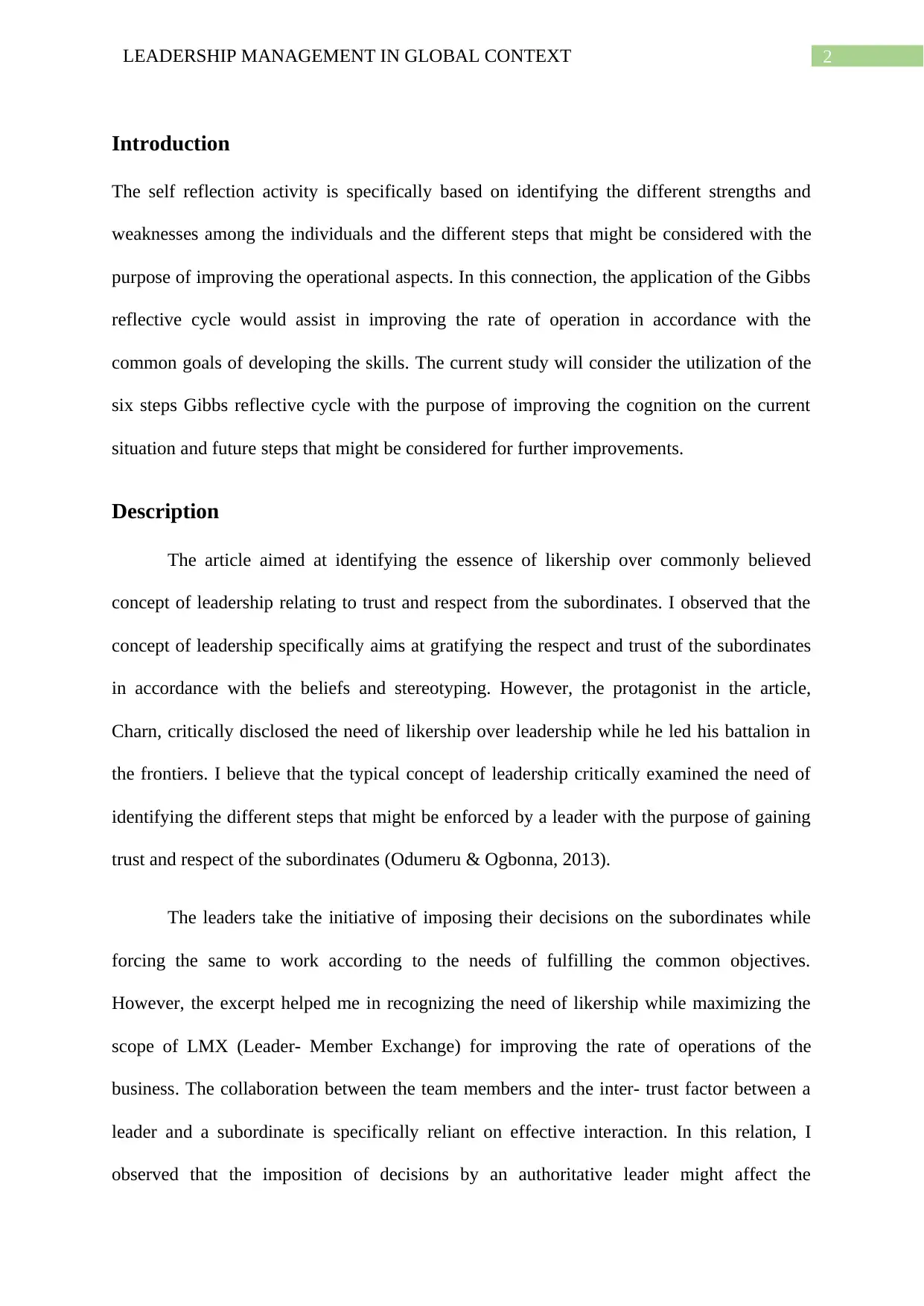
2LEADERSHIP MANAGEMENT IN GLOBAL CONTEXT
Introduction
The self reflection activity is specifically based on identifying the different strengths and
weaknesses among the individuals and the different steps that might be considered with the
purpose of improving the operational aspects. In this connection, the application of the Gibbs
reflective cycle would assist in improving the rate of operation in accordance with the
common goals of developing the skills. The current study will consider the utilization of the
six steps Gibbs reflective cycle with the purpose of improving the cognition on the current
situation and future steps that might be considered for further improvements.
Description
The article aimed at identifying the essence of likership over commonly believed
concept of leadership relating to trust and respect from the subordinates. I observed that the
concept of leadership specifically aims at gratifying the respect and trust of the subordinates
in accordance with the beliefs and stereotyping. However, the protagonist in the article,
Charn, critically disclosed the need of likership over leadership while he led his battalion in
the frontiers. I believe that the typical concept of leadership critically examined the need of
identifying the different steps that might be enforced by a leader with the purpose of gaining
trust and respect of the subordinates (Odumeru & Ogbonna, 2013).
The leaders take the initiative of imposing their decisions on the subordinates while
forcing the same to work according to the needs of fulfilling the common objectives.
However, the excerpt helped me in recognizing the need of likership while maximizing the
scope of LMX (Leader- Member Exchange) for improving the rate of operations of the
business. The collaboration between the team members and the inter- trust factor between a
leader and a subordinate is specifically reliant on effective interaction. In this relation, I
observed that the imposition of decisions by an authoritative leader might affect the
Introduction
The self reflection activity is specifically based on identifying the different strengths and
weaknesses among the individuals and the different steps that might be considered with the
purpose of improving the operational aspects. In this connection, the application of the Gibbs
reflective cycle would assist in improving the rate of operation in accordance with the
common goals of developing the skills. The current study will consider the utilization of the
six steps Gibbs reflective cycle with the purpose of improving the cognition on the current
situation and future steps that might be considered for further improvements.
Description
The article aimed at identifying the essence of likership over commonly believed
concept of leadership relating to trust and respect from the subordinates. I observed that the
concept of leadership specifically aims at gratifying the respect and trust of the subordinates
in accordance with the beliefs and stereotyping. However, the protagonist in the article,
Charn, critically disclosed the need of likership over leadership while he led his battalion in
the frontiers. I believe that the typical concept of leadership critically examined the need of
identifying the different steps that might be enforced by a leader with the purpose of gaining
trust and respect of the subordinates (Odumeru & Ogbonna, 2013).
The leaders take the initiative of imposing their decisions on the subordinates while
forcing the same to work according to the needs of fulfilling the common objectives.
However, the excerpt helped me in recognizing the need of likership while maximizing the
scope of LMX (Leader- Member Exchange) for improving the rate of operations of the
business. The collaboration between the team members and the inter- trust factor between a
leader and a subordinate is specifically reliant on effective interaction. In this relation, I
observed that the imposition of decisions by an authoritative leader might affect the
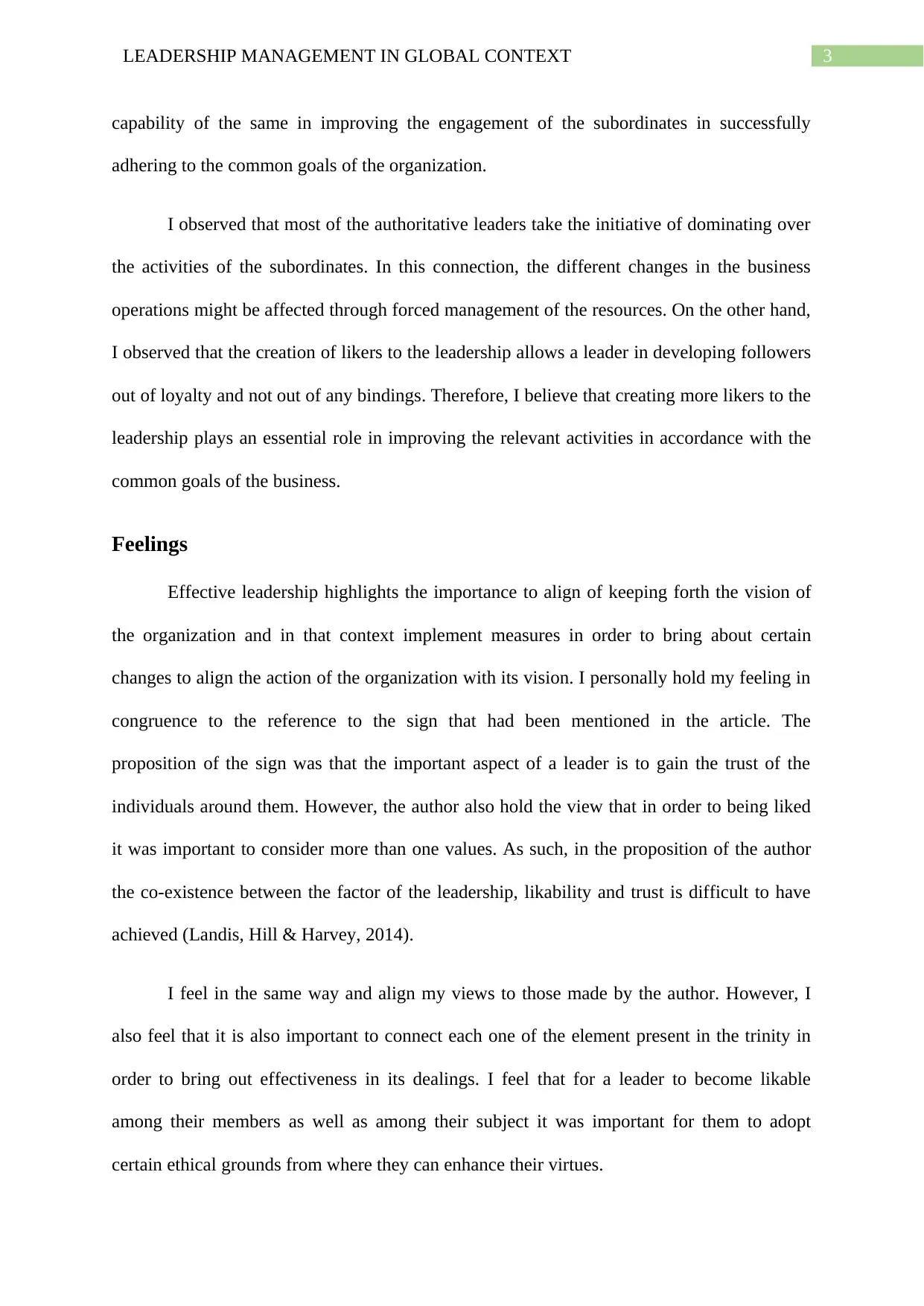
3LEADERSHIP MANAGEMENT IN GLOBAL CONTEXT
capability of the same in improving the engagement of the subordinates in successfully
adhering to the common goals of the organization.
I observed that most of the authoritative leaders take the initiative of dominating over
the activities of the subordinates. In this connection, the different changes in the business
operations might be affected through forced management of the resources. On the other hand,
I observed that the creation of likers to the leadership allows a leader in developing followers
out of loyalty and not out of any bindings. Therefore, I believe that creating more likers to the
leadership plays an essential role in improving the relevant activities in accordance with the
common goals of the business.
Feelings
Effective leadership highlights the importance to align of keeping forth the vision of
the organization and in that context implement measures in order to bring about certain
changes to align the action of the organization with its vision. I personally hold my feeling in
congruence to the reference to the sign that had been mentioned in the article. The
proposition of the sign was that the important aspect of a leader is to gain the trust of the
individuals around them. However, the author also hold the view that in order to being liked
it was important to consider more than one values. As such, in the proposition of the author
the co-existence between the factor of the leadership, likability and trust is difficult to have
achieved (Landis, Hill & Harvey, 2014).
I feel in the same way and align my views to those made by the author. However, I
also feel that it is also important to connect each one of the element present in the trinity in
order to bring out effectiveness in its dealings. I feel that for a leader to become likable
among their members as well as among their subject it was important for them to adopt
certain ethical grounds from where they can enhance their virtues.
capability of the same in improving the engagement of the subordinates in successfully
adhering to the common goals of the organization.
I observed that most of the authoritative leaders take the initiative of dominating over
the activities of the subordinates. In this connection, the different changes in the business
operations might be affected through forced management of the resources. On the other hand,
I observed that the creation of likers to the leadership allows a leader in developing followers
out of loyalty and not out of any bindings. Therefore, I believe that creating more likers to the
leadership plays an essential role in improving the relevant activities in accordance with the
common goals of the business.
Feelings
Effective leadership highlights the importance to align of keeping forth the vision of
the organization and in that context implement measures in order to bring about certain
changes to align the action of the organization with its vision. I personally hold my feeling in
congruence to the reference to the sign that had been mentioned in the article. The
proposition of the sign was that the important aspect of a leader is to gain the trust of the
individuals around them. However, the author also hold the view that in order to being liked
it was important to consider more than one values. As such, in the proposition of the author
the co-existence between the factor of the leadership, likability and trust is difficult to have
achieved (Landis, Hill & Harvey, 2014).
I feel in the same way and align my views to those made by the author. However, I
also feel that it is also important to connect each one of the element present in the trinity in
order to bring out effectiveness in its dealings. I feel that for a leader to become likable
among their members as well as among their subject it was important for them to adopt
certain ethical grounds from where they can enhance their virtues.
⊘ This is a preview!⊘
Do you want full access?
Subscribe today to unlock all pages.

Trusted by 1+ million students worldwide
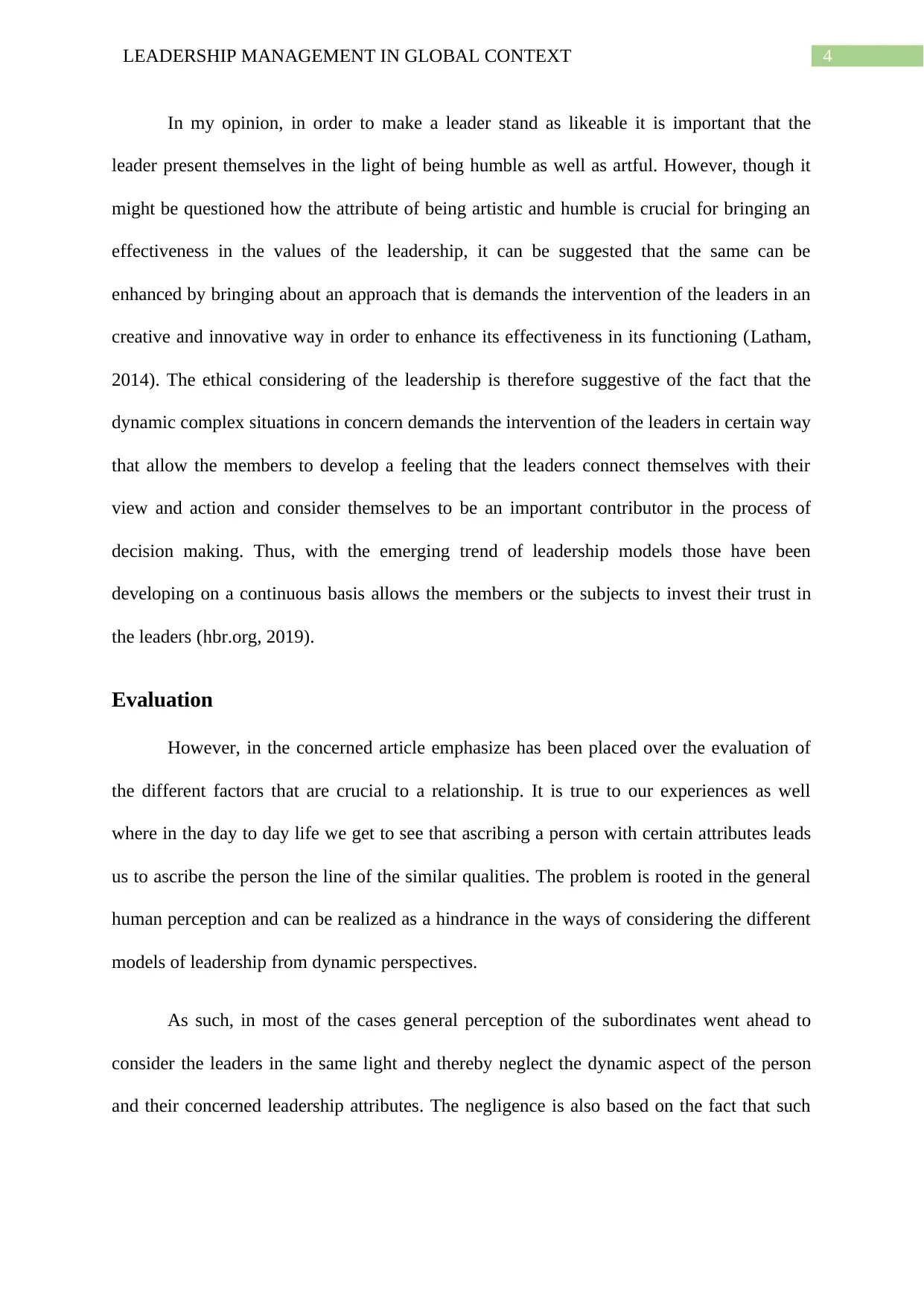
4LEADERSHIP MANAGEMENT IN GLOBAL CONTEXT
In my opinion, in order to make a leader stand as likeable it is important that the
leader present themselves in the light of being humble as well as artful. However, though it
might be questioned how the attribute of being artistic and humble is crucial for bringing an
effectiveness in the values of the leadership, it can be suggested that the same can be
enhanced by bringing about an approach that is demands the intervention of the leaders in an
creative and innovative way in order to enhance its effectiveness in its functioning (Latham,
2014). The ethical considering of the leadership is therefore suggestive of the fact that the
dynamic complex situations in concern demands the intervention of the leaders in certain way
that allow the members to develop a feeling that the leaders connect themselves with their
view and action and consider themselves to be an important contributor in the process of
decision making. Thus, with the emerging trend of leadership models those have been
developing on a continuous basis allows the members or the subjects to invest their trust in
the leaders (hbr.org, 2019).
Evaluation
However, in the concerned article emphasize has been placed over the evaluation of
the different factors that are crucial to a relationship. It is true to our experiences as well
where in the day to day life we get to see that ascribing a person with certain attributes leads
us to ascribe the person the line of the similar qualities. The problem is rooted in the general
human perception and can be realized as a hindrance in the ways of considering the different
models of leadership from dynamic perspectives.
As such, in most of the cases general perception of the subordinates went ahead to
consider the leaders in the same light and thereby neglect the dynamic aspect of the person
and their concerned leadership attributes. The negligence is also based on the fact that such
In my opinion, in order to make a leader stand as likeable it is important that the
leader present themselves in the light of being humble as well as artful. However, though it
might be questioned how the attribute of being artistic and humble is crucial for bringing an
effectiveness in the values of the leadership, it can be suggested that the same can be
enhanced by bringing about an approach that is demands the intervention of the leaders in an
creative and innovative way in order to enhance its effectiveness in its functioning (Latham,
2014). The ethical considering of the leadership is therefore suggestive of the fact that the
dynamic complex situations in concern demands the intervention of the leaders in certain way
that allow the members to develop a feeling that the leaders connect themselves with their
view and action and consider themselves to be an important contributor in the process of
decision making. Thus, with the emerging trend of leadership models those have been
developing on a continuous basis allows the members or the subjects to invest their trust in
the leaders (hbr.org, 2019).
Evaluation
However, in the concerned article emphasize has been placed over the evaluation of
the different factors that are crucial to a relationship. It is true to our experiences as well
where in the day to day life we get to see that ascribing a person with certain attributes leads
us to ascribe the person the line of the similar qualities. The problem is rooted in the general
human perception and can be realized as a hindrance in the ways of considering the different
models of leadership from dynamic perspectives.
As such, in most of the cases general perception of the subordinates went ahead to
consider the leaders in the same light and thereby neglect the dynamic aspect of the person
and their concerned leadership attributes. The negligence is also based on the fact that such
Paraphrase This Document
Need a fresh take? Get an instant paraphrase of this document with our AI Paraphraser
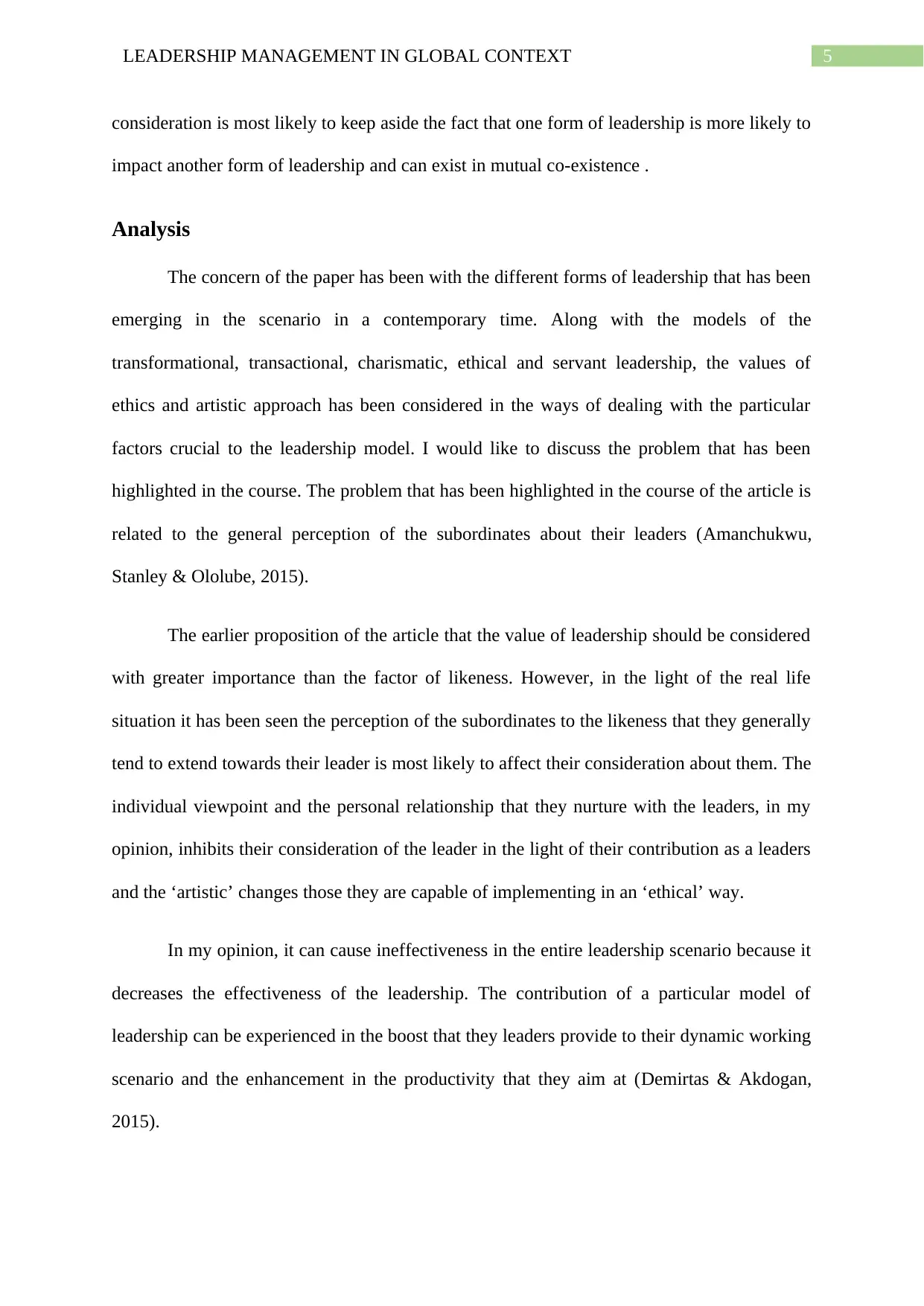
5LEADERSHIP MANAGEMENT IN GLOBAL CONTEXT
consideration is most likely to keep aside the fact that one form of leadership is more likely to
impact another form of leadership and can exist in mutual co-existence .
Analysis
The concern of the paper has been with the different forms of leadership that has been
emerging in the scenario in a contemporary time. Along with the models of the
transformational, transactional, charismatic, ethical and servant leadership, the values of
ethics and artistic approach has been considered in the ways of dealing with the particular
factors crucial to the leadership model. I would like to discuss the problem that has been
highlighted in the course. The problem that has been highlighted in the course of the article is
related to the general perception of the subordinates about their leaders (Amanchukwu,
Stanley & Ololube, 2015).
The earlier proposition of the article that the value of leadership should be considered
with greater importance than the factor of likeness. However, in the light of the real life
situation it has been seen the perception of the subordinates to the likeness that they generally
tend to extend towards their leader is most likely to affect their consideration about them. The
individual viewpoint and the personal relationship that they nurture with the leaders, in my
opinion, inhibits their consideration of the leader in the light of their contribution as a leaders
and the ‘artistic’ changes those they are capable of implementing in an ‘ethical’ way.
In my opinion, it can cause ineffectiveness in the entire leadership scenario because it
decreases the effectiveness of the leadership. The contribution of a particular model of
leadership can be experienced in the boost that they leaders provide to their dynamic working
scenario and the enhancement in the productivity that they aim at (Demirtas & Akdogan,
2015).
consideration is most likely to keep aside the fact that one form of leadership is more likely to
impact another form of leadership and can exist in mutual co-existence .
Analysis
The concern of the paper has been with the different forms of leadership that has been
emerging in the scenario in a contemporary time. Along with the models of the
transformational, transactional, charismatic, ethical and servant leadership, the values of
ethics and artistic approach has been considered in the ways of dealing with the particular
factors crucial to the leadership model. I would like to discuss the problem that has been
highlighted in the course. The problem that has been highlighted in the course of the article is
related to the general perception of the subordinates about their leaders (Amanchukwu,
Stanley & Ololube, 2015).
The earlier proposition of the article that the value of leadership should be considered
with greater importance than the factor of likeness. However, in the light of the real life
situation it has been seen the perception of the subordinates to the likeness that they generally
tend to extend towards their leader is most likely to affect their consideration about them. The
individual viewpoint and the personal relationship that they nurture with the leaders, in my
opinion, inhibits their consideration of the leader in the light of their contribution as a leaders
and the ‘artistic’ changes those they are capable of implementing in an ‘ethical’ way.
In my opinion, it can cause ineffectiveness in the entire leadership scenario because it
decreases the effectiveness of the leadership. The contribution of a particular model of
leadership can be experienced in the boost that they leaders provide to their dynamic working
scenario and the enhancement in the productivity that they aim at (Demirtas & Akdogan,
2015).
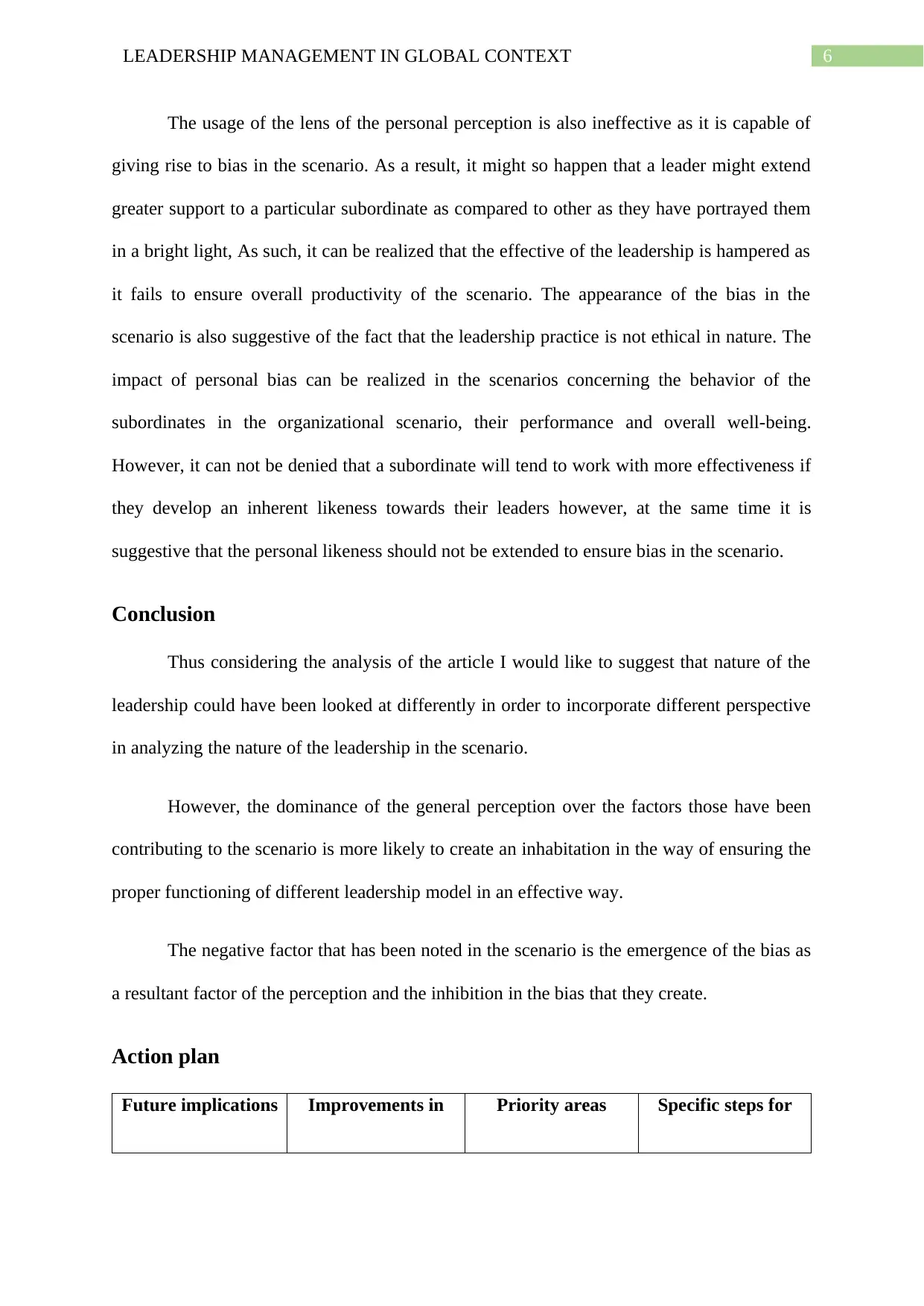
6LEADERSHIP MANAGEMENT IN GLOBAL CONTEXT
The usage of the lens of the personal perception is also ineffective as it is capable of
giving rise to bias in the scenario. As a result, it might so happen that a leader might extend
greater support to a particular subordinate as compared to other as they have portrayed them
in a bright light, As such, it can be realized that the effective of the leadership is hampered as
it fails to ensure overall productivity of the scenario. The appearance of the bias in the
scenario is also suggestive of the fact that the leadership practice is not ethical in nature. The
impact of personal bias can be realized in the scenarios concerning the behavior of the
subordinates in the organizational scenario, their performance and overall well-being.
However, it can not be denied that a subordinate will tend to work with more effectiveness if
they develop an inherent likeness towards their leaders however, at the same time it is
suggestive that the personal likeness should not be extended to ensure bias in the scenario.
Conclusion
Thus considering the analysis of the article I would like to suggest that nature of the
leadership could have been looked at differently in order to incorporate different perspective
in analyzing the nature of the leadership in the scenario.
However, the dominance of the general perception over the factors those have been
contributing to the scenario is more likely to create an inhabitation in the way of ensuring the
proper functioning of different leadership model in an effective way.
The negative factor that has been noted in the scenario is the emergence of the bias as
a resultant factor of the perception and the inhibition in the bias that they create.
Action plan
Future implications Improvements in Priority areas Specific steps for
The usage of the lens of the personal perception is also ineffective as it is capable of
giving rise to bias in the scenario. As a result, it might so happen that a leader might extend
greater support to a particular subordinate as compared to other as they have portrayed them
in a bright light, As such, it can be realized that the effective of the leadership is hampered as
it fails to ensure overall productivity of the scenario. The appearance of the bias in the
scenario is also suggestive of the fact that the leadership practice is not ethical in nature. The
impact of personal bias can be realized in the scenarios concerning the behavior of the
subordinates in the organizational scenario, their performance and overall well-being.
However, it can not be denied that a subordinate will tend to work with more effectiveness if
they develop an inherent likeness towards their leaders however, at the same time it is
suggestive that the personal likeness should not be extended to ensure bias in the scenario.
Conclusion
Thus considering the analysis of the article I would like to suggest that nature of the
leadership could have been looked at differently in order to incorporate different perspective
in analyzing the nature of the leadership in the scenario.
However, the dominance of the general perception over the factors those have been
contributing to the scenario is more likely to create an inhabitation in the way of ensuring the
proper functioning of different leadership model in an effective way.
The negative factor that has been noted in the scenario is the emergence of the bias as
a resultant factor of the perception and the inhibition in the bias that they create.
Action plan
Future implications Improvements in Priority areas Specific steps for
⊘ This is a preview!⊘
Do you want full access?
Subscribe today to unlock all pages.

Trusted by 1+ million students worldwide
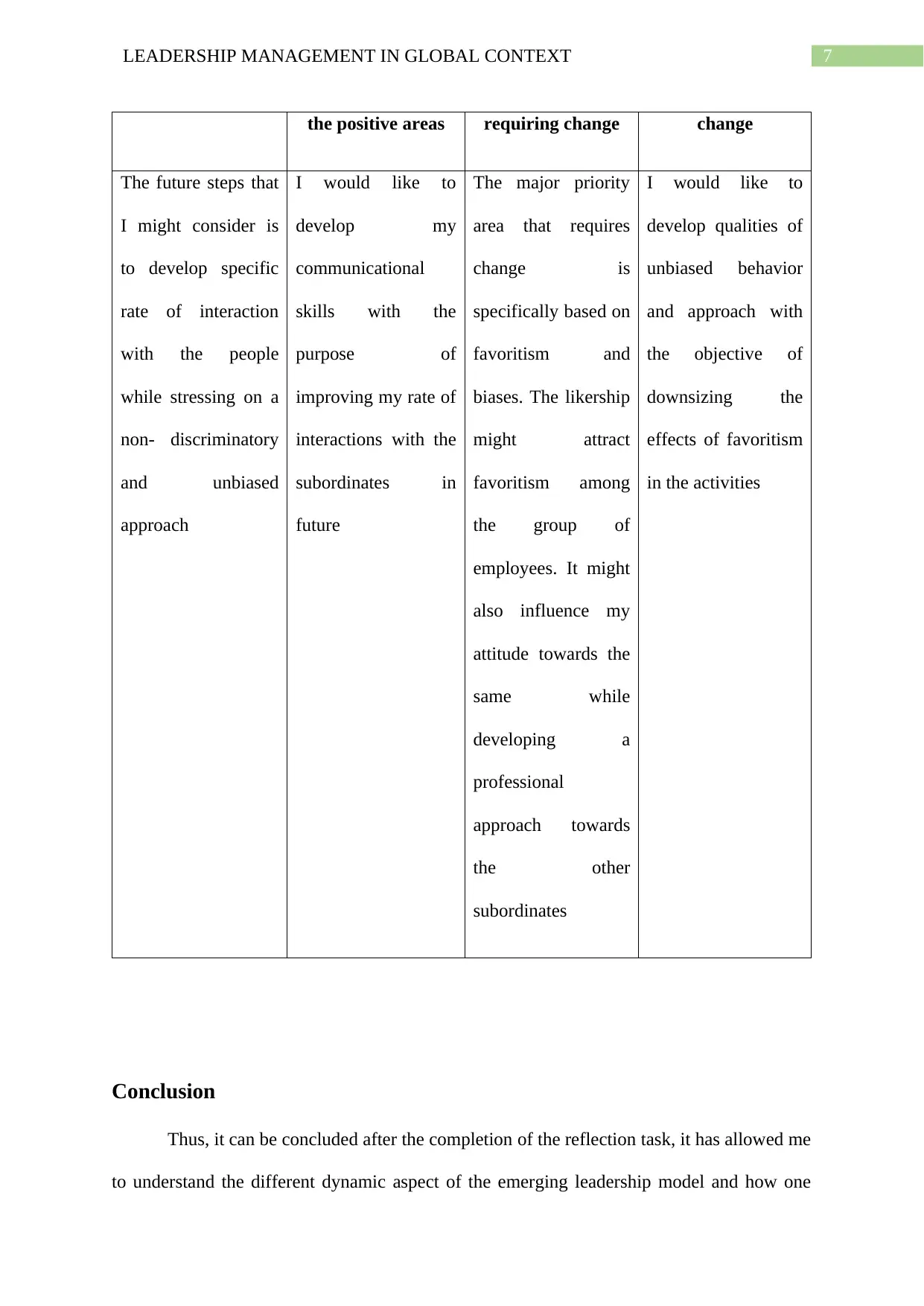
7LEADERSHIP MANAGEMENT IN GLOBAL CONTEXT
the positive areas requiring change change
The future steps that
I might consider is
to develop specific
rate of interaction
with the people
while stressing on a
non- discriminatory
and unbiased
approach
I would like to
develop my
communicational
skills with the
purpose of
improving my rate of
interactions with the
subordinates in
future
The major priority
area that requires
change is
specifically based on
favoritism and
biases. The likership
might attract
favoritism among
the group of
employees. It might
also influence my
attitude towards the
same while
developing a
professional
approach towards
the other
subordinates
I would like to
develop qualities of
unbiased behavior
and approach with
the objective of
downsizing the
effects of favoritism
in the activities
Conclusion
Thus, it can be concluded after the completion of the reflection task, it has allowed me
to understand the different dynamic aspect of the emerging leadership model and how one
the positive areas requiring change change
The future steps that
I might consider is
to develop specific
rate of interaction
with the people
while stressing on a
non- discriminatory
and unbiased
approach
I would like to
develop my
communicational
skills with the
purpose of
improving my rate of
interactions with the
subordinates in
future
The major priority
area that requires
change is
specifically based on
favoritism and
biases. The likership
might attract
favoritism among
the group of
employees. It might
also influence my
attitude towards the
same while
developing a
professional
approach towards
the other
subordinates
I would like to
develop qualities of
unbiased behavior
and approach with
the objective of
downsizing the
effects of favoritism
in the activities
Conclusion
Thus, it can be concluded after the completion of the reflection task, it has allowed me
to understand the different dynamic aspect of the emerging leadership model and how one
Paraphrase This Document
Need a fresh take? Get an instant paraphrase of this document with our AI Paraphraser
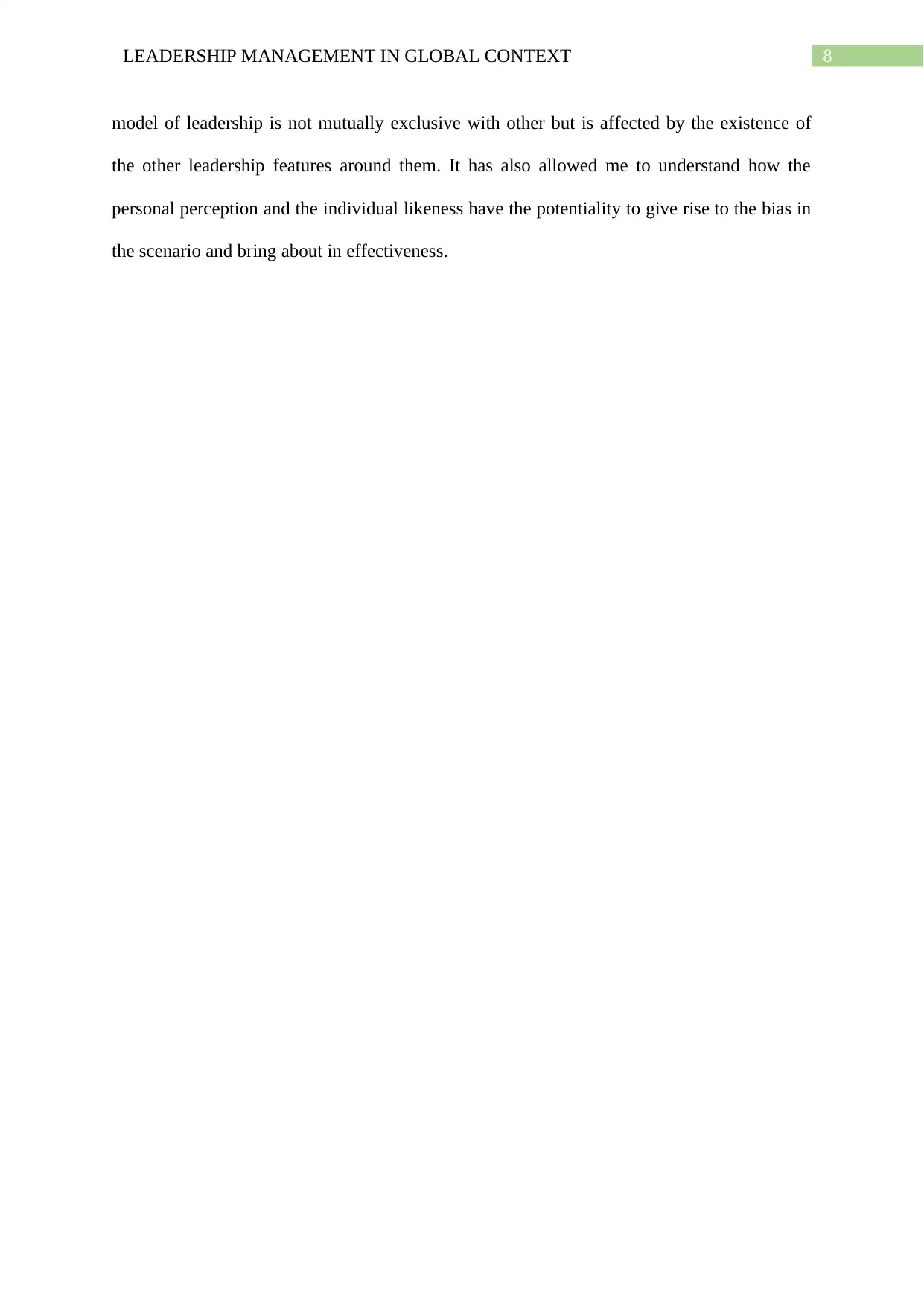
8LEADERSHIP MANAGEMENT IN GLOBAL CONTEXT
model of leadership is not mutually exclusive with other but is affected by the existence of
the other leadership features around them. It has also allowed me to understand how the
personal perception and the individual likeness have the potentiality to give rise to the bias in
the scenario and bring about in effectiveness.
model of leadership is not mutually exclusive with other but is affected by the existence of
the other leadership features around them. It has also allowed me to understand how the
personal perception and the individual likeness have the potentiality to give rise to the bias in
the scenario and bring about in effectiveness.
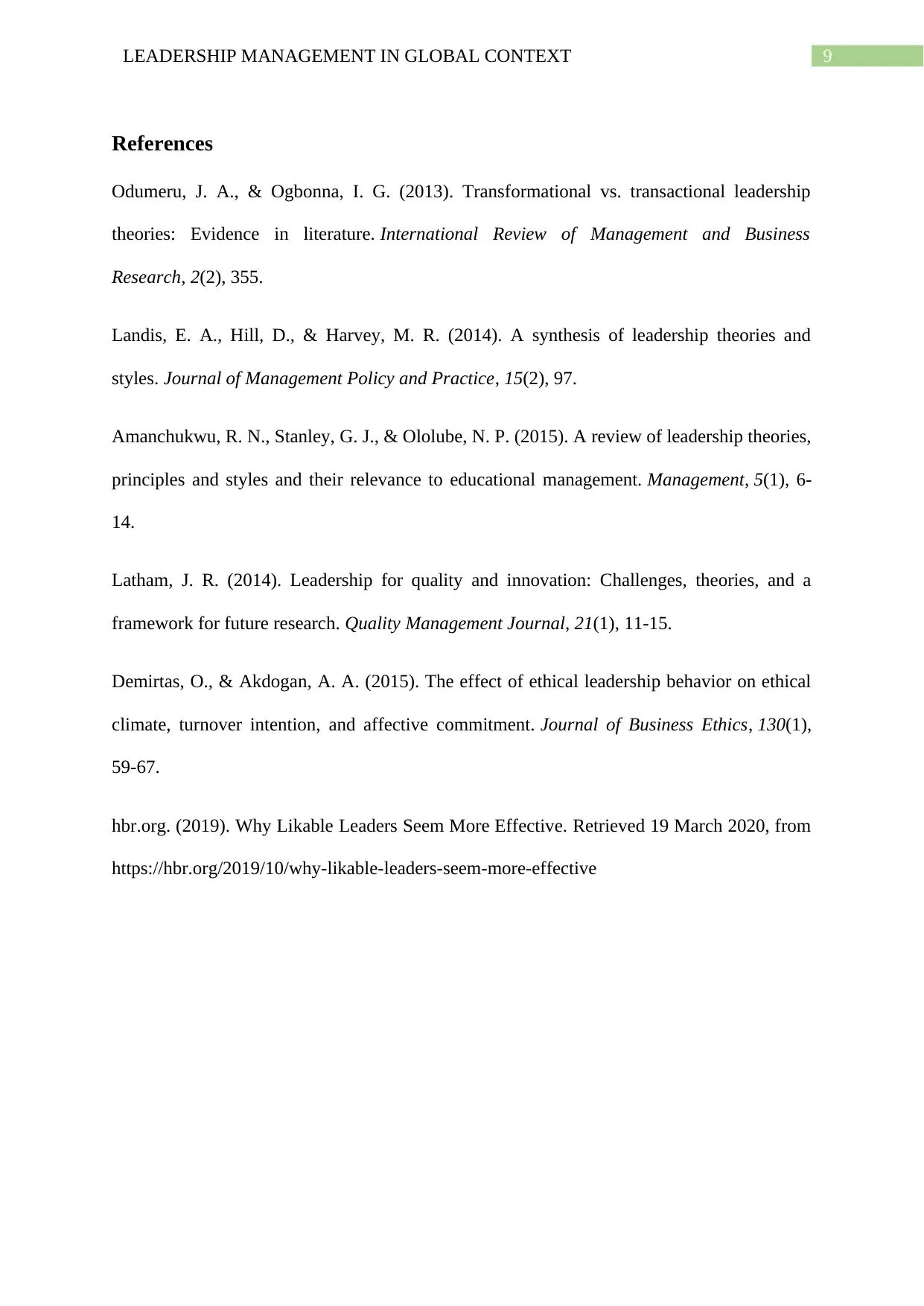
9LEADERSHIP MANAGEMENT IN GLOBAL CONTEXT
References
Odumeru, J. A., & Ogbonna, I. G. (2013). Transformational vs. transactional leadership
theories: Evidence in literature. International Review of Management and Business
Research, 2(2), 355.
Landis, E. A., Hill, D., & Harvey, M. R. (2014). A synthesis of leadership theories and
styles. Journal of Management Policy and Practice, 15(2), 97.
Amanchukwu, R. N., Stanley, G. J., & Ololube, N. P. (2015). A review of leadership theories,
principles and styles and their relevance to educational management. Management, 5(1), 6-
14.
Latham, J. R. (2014). Leadership for quality and innovation: Challenges, theories, and a
framework for future research. Quality Management Journal, 21(1), 11-15.
Demirtas, O., & Akdogan, A. A. (2015). The effect of ethical leadership behavior on ethical
climate, turnover intention, and affective commitment. Journal of Business Ethics, 130(1),
59-67.
hbr.org. (2019). Why Likable Leaders Seem More Effective. Retrieved 19 March 2020, from
https://hbr.org/2019/10/why-likable-leaders-seem-more-effective
References
Odumeru, J. A., & Ogbonna, I. G. (2013). Transformational vs. transactional leadership
theories: Evidence in literature. International Review of Management and Business
Research, 2(2), 355.
Landis, E. A., Hill, D., & Harvey, M. R. (2014). A synthesis of leadership theories and
styles. Journal of Management Policy and Practice, 15(2), 97.
Amanchukwu, R. N., Stanley, G. J., & Ololube, N. P. (2015). A review of leadership theories,
principles and styles and their relevance to educational management. Management, 5(1), 6-
14.
Latham, J. R. (2014). Leadership for quality and innovation: Challenges, theories, and a
framework for future research. Quality Management Journal, 21(1), 11-15.
Demirtas, O., & Akdogan, A. A. (2015). The effect of ethical leadership behavior on ethical
climate, turnover intention, and affective commitment. Journal of Business Ethics, 130(1),
59-67.
hbr.org. (2019). Why Likable Leaders Seem More Effective. Retrieved 19 March 2020, from
https://hbr.org/2019/10/why-likable-leaders-seem-more-effective
⊘ This is a preview!⊘
Do you want full access?
Subscribe today to unlock all pages.

Trusted by 1+ million students worldwide
1 out of 9
Related Documents
Your All-in-One AI-Powered Toolkit for Academic Success.
+13062052269
info@desklib.com
Available 24*7 on WhatsApp / Email
![[object Object]](/_next/static/media/star-bottom.7253800d.svg)
Unlock your academic potential
Copyright © 2020–2025 A2Z Services. All Rights Reserved. Developed and managed by ZUCOL.





